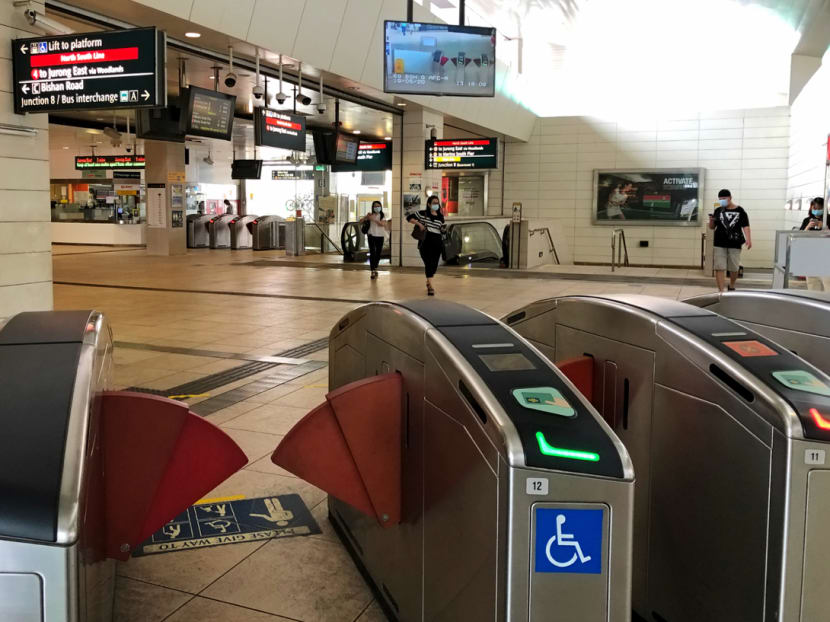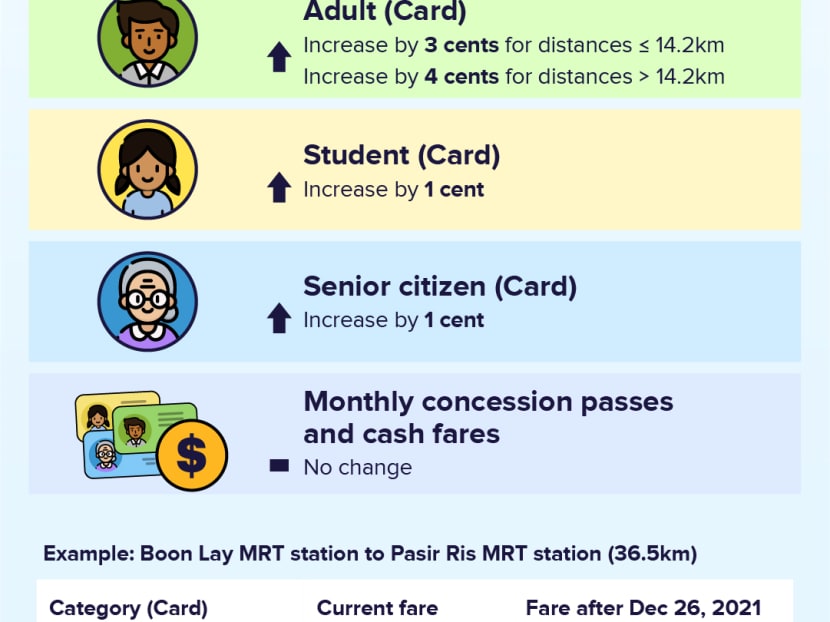Bus, train fares to rise by 3 to 4 cents from Dec 26; 600,000 public transport vouchers for eligible households
SINGAPORE — From Dec 26, bus and train card fares for adults will increase by three to four cents, while card fares for students, senior citizens, persons with disabilities and low wage workers will be raised by one cent per journey, the Public Transport Council (PTC) said on Wednesday (Nov 3).

The Public Transport Council stressed that this year’s fare hikes do not factor in the severe fall in ridership observed in 2020 as a result of the Covid-19 pandemic.
- Adult card fares will increase by 3 cents for journeys under 14.2km, and 4 cents for trips further than that
- Concession fares for students, seniors, persons with disabilities and lower wage workers to go up by 1 cent per journey
- Fare hike would have been much higher — by 60 cents — if the Public Transport Council did not decide to exclude pandemic-induced fall in ridership last year in its calculations
- PTC said costs for public transport operators have been rising due to Covid-19
- A record 600,000 public transport vouchers, valued at S$30 each, will be disbursed to eligible households
SINGAPORE — From Dec 26, bus and train card fares for adults will increase by three to four cents, while card fares for students, senior citizens, persons with disabilities and low wage workers will be raised by one cent per journey, the Public Transport Council (PTC) said on Wednesday (Nov 3).
There will be no change to the fares of monthly concession and travel passes, as well as cash fares.
Announcing the results of the latest fare review exercise, the PTC stressed that this year’s fare hikes do not factor in the severe fall in ridership observed in 2020 as a result of the Covid-19 pandemic. Otherwise, fares would need to go up drastically.
The PTC decided to exclude the network capacity factor (NCF) from February to December 2020, to coincide with the fall in ridership owing to the pandemic.
Instead, it only took into account the NCF for the month of January last year.
The NCF for the months of February to December 2020, if included, would have led to an increase of 60 cents in adult transport fares.
This network factor is a major component of the fare formula, which is used to determine the maximum allowable increase for fares.
The parameter is meant to compensate transport operators for their operating costs relative to commuter demand.

In general, fares will be adjusted upwards by 2.2 per cent, after taking into account the 4.4 per cent increase from the previous fare review exercise that was deferred to this year due to Covid-19.
Fares have not been raised for two years as a result of the deferment and were last raised in 2019 by 7 per cent, or nine cents.
This year's fare hike of 2.2 per cent translates to an increase in fare revenue of about S$34.2 million a year.
This is significantly lower than what would have been collected by a 51.5 per cent increase in fares if the full ridership impact was taken into account based on the current fare formula.
In 2020, bus ridership had fallen 30 per cent to 2.88 million rides a day on average for the whole year, which was the lowest level since 2006. MRT ridership also dropped 40 per cent to 2.02 million rides a day last year, the lowest since 2009.
PTC’s decision means that public transport operators like SMRT and SBS Transit, which have received around S$2 billion each year in government subsidies, would have to bear the brunt of the pandemic-induced fall in ridership despite largely keeping bus and train frequencies to pre-Covid levels.

At the same time, the pandemic has also led to rising costs for transport operators who have had to step up cleaning and disinfecting service, which cost as much as S$4 million for one operator, on top of other costs, said the PTC.
Both rail operators would have incurred “significant losses” if not for the broad-based support from the Government, the council added.
PTC chairman Richard Magnus said in a press conference on Wednesday that the council needed to find a “judicious balance” on who shares the burden of public transport costs while not allowing services to deteriorate, especially amid a pandemic.
“Last year, there was no change in fares for all commuters and I wish we could make a similar announcement this year. But after days of working through the options, we have concluded that it is not possible for current fares to remain the same,” he said.
FARE REVIEW OUTLOOK
This principle to not pass on the costs of falling ridership to commuters, through excluding NCF for affected months, will be applied next year, too, if ridership continues to be low in the entire year, added PTC chief executive Tan Kim Hong.
Said Mr Tan: “If indeed the peak demand has come down, there is the opportunity to adjust the capacity to be more in line with the load demand such that it is more cost efficient.”
He added that public transport operators will also have to do their part to look into other ways of cost management, such as using more automation, reducing reliance on labour and becoming more energy efficient.
Mr Magnus said the PTC will have to consider a host of factors when it comes to next year’s fare review exercise, as well as the review of the fare formula.
“The peak (ridership) issue is just one part of many moving parts in looking at the public transport system — infrastructure costs, financial viability, affordability, and making (this) public good a part of a growing Singapore,” said the PTC chairman.
RECORD NUMBER OF PUBLIC TRANSPORT VOUCHERS TO BE GIVEN
Both rail operators will also have to contribute a total of S$2.23 million in revenue to the Public Transport Fund this year, said the PTC. The fund helps households cope with adjustments in fares through public transport vouchers.
In a separate statement on Tuesday, the Transport Ministry and the People’s Association said a total of 600,000 of such vouchers, valued at S$30 each, will be given out to households to top up fare cards and buy monthly concession passes.
The vouchers will cover more resident households this time, and those with monthly household income per person of not more than S$1,600 will qualify for the latest exercise. This is an increase from the S$1,200 income criterion in the last exercise in 2019.
Due to safe distancing measures, the vouchers will be disbursed in three stages:
Eligible households that received the voucher in the 2019 exercise will receive the latest voucher via post automatically. Notification letters will be sent to eligible households by end-December 2021.
Households who meet the income criterion but did not receive the voucher automatically can apply online for one from early 2022.
Households who meet the income criterion, but prefer to apply in person at their local community centres, can do so in a third stage. More details will be provided later.











